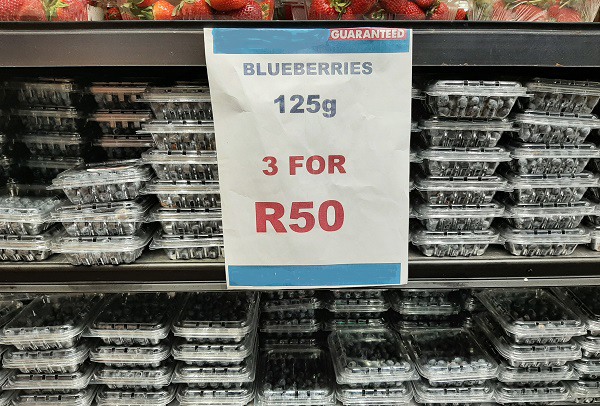The small South African market is receiving an unusually large amount of blueberries this season, fruit that was grown for export, causing the domestic market price to crash to an average of R12 (0.65 euro) per kilogram.
These prices represent a precipitous drop from past prices. The previous record low, in December last year, was still double the current price. The domestic market is so small that some agricultural economists have wondered whether unrealistically high retail prices could be hindering local demand.
 Blueberry supermarket promotion of a month ago: R50 (2.7 euros) for 3 punnets of 125g. There are now stores offering three punnets for R10 (0.54 euros)
Blueberry supermarket promotion of a month ago: R50 (2.7 euros) for 3 punnets of 125g. There are now stores offering three punnets for R10 (0.54 euros)
Air freight shortage & cold chain delays
There is a shortage of air freight space from South Africa, causing delays in the cold chain and, given the oversupply in Europe due to Peru's high volumes, some blueberry producers decide to take the low-risk (and low-return) route of selling it locally.
Heavy early rain in the northern parts of South Africa compounded the situation: it has had a deleterious effect on quality and shelf life in some areas, rendering the berries unfit for the sea voyage to the Northern Hemisphere.
Some of the rain-affected fruit sold locally is, according to one grower, "actually not a great advertisement for South African berries. Usually our quality is much better."
Furthermore, cold weather in the northern areas have reduced the export estimate by a thousand tonnes.
Need for alternative markets
The arrival of "massive volumes" from Peru in recent weeks has resulted in more competition in Europe (a scenario familiar to South Africa's avocado growers) and re-emphasised the risk of an over-reliance on a few markets..
"Any other market presents an alternative to Europe at this stage," says a blueberry exporter, "but there are also reports of oversupply in some of the Eastern markets."
"Peru has a big peak of blueberries over a short period of time, so in about two weeks the market should start emptying again," he continues.
Last season only 4% of South African blueberries were sent to the Far East, a further 2% to the Middle East and less than 1% to Africa and Indian Ocean islands.
The South African blueberry industry has been hoping that its high employment creation ability will stand it in good stead when commodities are prioritised in China market access talks.
